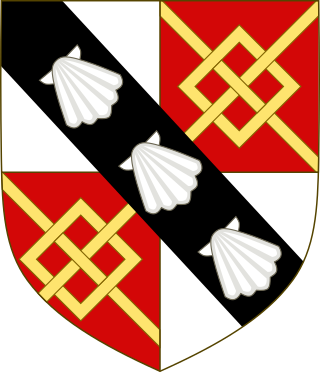
The Spencer family is an aristocratic British family. From the 16th century, its members have held numerous titles, including the dukedom of Marlborough, the earldoms of Sunderland and Spencer, and the Churchill barony. Two prominent members of the family during the 20th century were Sir Winston Churchill and Diana, Princess of Wales.
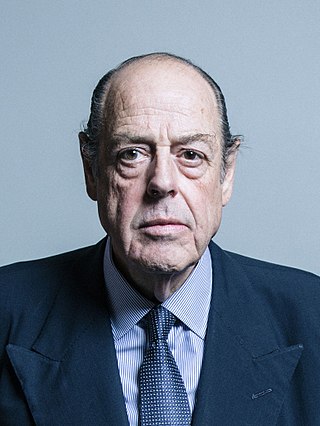
Arthur Nicholas Winston Soames, Baron Soames of Fletching, is a British Conservative Party politician who served as the Member of Parliament (MP) for Mid Sussex from 1997 to 2019, having previously served as the MP for Crawley from 1983 to 1997.
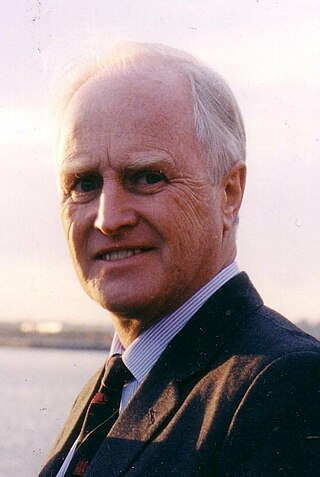
Winston Spencer Churchill, generally known as Winston Churchill, was an English Conservative politician and a grandson of British prime minister Winston Churchill. During the period of his prominence as a public figure, he was normally referred to as Winston Churchill, in order to distinguish him from his grandfather. His father Randolph Churchill was also an MP.

Arthur Christopher John Soames, Baron Soames, was a British Conservative politician who served as a European Commissioner and the last Governor of Southern Rhodesia. He was previously Member of Parliament (MP) for Bedford from 1950 to 1966. He held several government posts and attained Cabinet rank.

Major Randolph Frederick Edward Spencer Churchill was an English journalist, writer and politician.
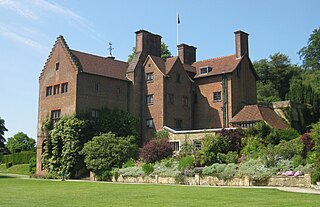
Chartwell is a country house near Westerham, Kent, in South East England. For over forty years it was the home of Sir Winston Churchill. He bought the property in September 1922 and lived there until shortly before his death in January 1965. In the 1930s, when Churchill was out of political office, Chartwell became the centre of his world. At his dining table, he gathered those who could assist his campaign against German re-armament and the British government's response of appeasement; in his study, he composed speeches and wrote books; in his garden, he built walls, constructed lakes and painted. During the Second World War, Chartwell was largely unused, the Churchills returning after he lost the 1945 election. In 1953, when again prime minister, the house became Churchill's refuge when he suffered a debilitating stroke. In October 1964, he left for the last time, dying at his London home, 28 Hyde Park Gate, on 24 January 1965.

Clementine Ogilvy Spencer-Churchill, Baroness Spencer-Churchill, was the wife of Winston Churchill, Prime Minister of the United Kingdom, and a life peer in her own right. While she was legally the daughter of Sir Henry Hozier, her mother Lady Blanche's known infidelity and his suspected infertility make her paternity uncertain.
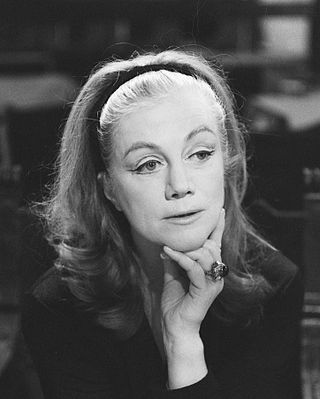
Sarah Millicent Hermione Touchet-Jesson, Baroness Audley, was an English actress and dancer and a daughter of Winston Churchill.

St Martin's Church in Bladon near Woodstock, Oxfordshire, England, is the Church of England parish church of Bladon-with-Woodstock. It is also the mother church of St Mary Magdalene at Woodstock, which was originally a chapel of ease. It is best known for the graves of the Spencer-Churchill family, including Sir Winston Churchill, in its churchyard.
The Army Benevolent Fund, formerly ABF The Soldiers' Charity, is the national charity of the British Army. Since 1944, it has provided a lifetime of support to soldiers, veterans and their immediate families when they are in need.

William James Robert Peel, 3rd Earl Peel,, styled Viscount Clanfield until 1969, is a British hereditary peer who was a Conservative peer from 15 May 1973 until October 2006 when, on his appointment as Lord Chamberlain of the Royal Household, he became a crossbench (non-partisan) member of the House of Lords.

Lin Hatfield Dodds, Australian social policy expert and former Churchill Fellow, is the CEO of The Benevolent Society, Australia's first and oldest charity, and was the Deputy Secretary for Social Policy in the Department of Prime Minister and Cabinet, and former National Director of UnitingCare Australia and Chair of the Australian Social Inclusion Board.
Edward Delaval Henry Astley, 22nd Baron Hastings, 12th Baronet Astley was an English peer and government minister. He had many interests, including politics, ballet, charity work, Italy, and renovating Seaton Delaval Hall.
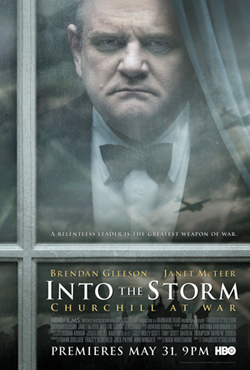
Into the Storm or Churchill at War(alt. title) is a 2009 biographical film about Winston Churchill and his days in office during the Second World War. The movie is directed by Thaddeus O'Sullivan and stars Brendan Gleeson as the British Prime Minister. Into the Storm is a sequel to the 2002 television film The Gathering Storm, which details the life of Churchill in the years just prior the war. Into the Storm had its first public premiere on HBO and HBO Canada on 31 May 2009.
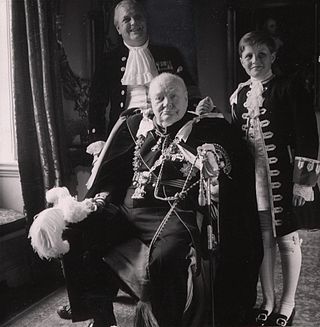
The family of Winston Churchill, twice Prime Minister of the United Kingdom, is a prominent family in the United Kingdom and the United States. Churchill is the eldest son of Lord Randolph Churchill, the son of the 7th Duke of Marlborough, and Jeanette Jerome, an American socialite and the 5th great-granddaughter of Robert Coe, an early politician in the New England Colonies. In 1908, Churchill married Clementine Hozier, the daughter of Sir Henry and Lady Blanche Hozier. Winston and Hozier had five children.
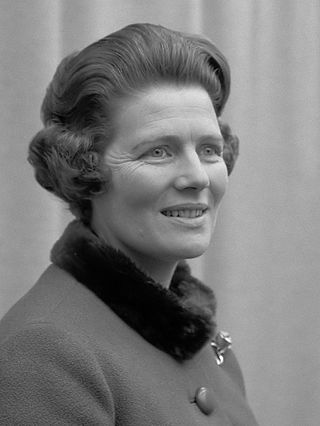
Mary Soames, Baroness Soames, was an English author. The youngest of the five children of Winston Churchill and his wife, Clementine, she worked for public organisations including the Red Cross and the Women's Voluntary Service from 1939 to 1941, and joined the Auxiliary Territorial Service in 1941. She was the wife of Conservative politician Christopher Soames.
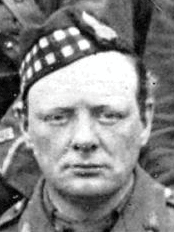
The 1917 Dundee by-election was a parliamentary by-election for the British House of Commons constituency of Dundee in the county of Angus held on 30 July 1917.
Churchill is an English surname. The Churchill family lived in Somerset in the town of Curcelle. The name Curcelle, of Norman origin, in England became confused with the name Churchill, which derives from the Old English cyrice, which means "church", and hyll, which means "hill". Notable people with the surname include:
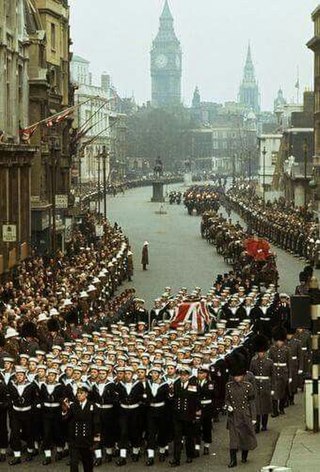
Sir Winston Churchill, the British statesman, soldier, and writer who served as Prime Minister of the United Kingdom during the Second World War, died on 24 January 1965, aged 90. His was the first state funeral in the United Kingdom for a non-member of the royal family since Edward Carson's in 1935. It was the last state funeral until Queen Elizabeth II's on 19 September 2022. The official funeral lasted for four days. Planning for the funeral, known as Operation Hope Not, began after Churchill's stroke in 1953 while in his second term as prime minister. After several revisions due to Churchill's continued survival, the plan was issued on 26 January 1965, two days after his death.

Colonel Sir Henry Montague Hozier, was a British Army officer who became secretary of Lloyd's of London. He was the father-in-law of Sir Winston Churchill, who married his daughter Clementine, though her paternity is doubted.

















